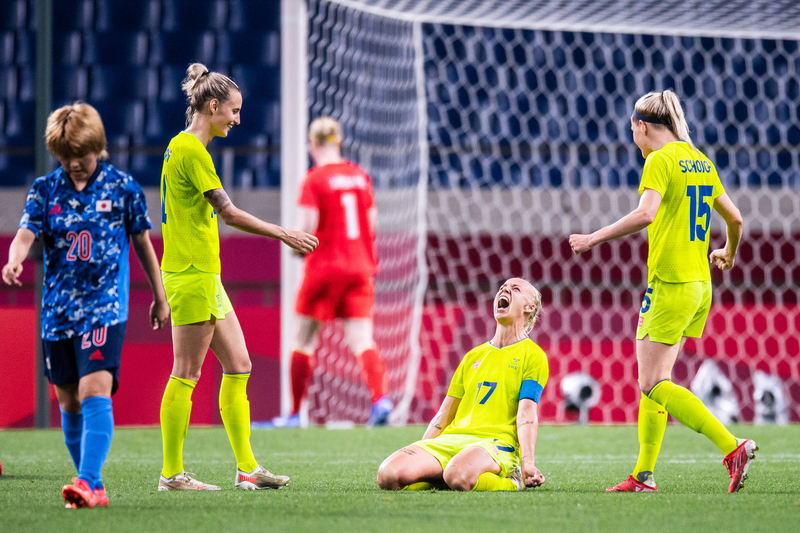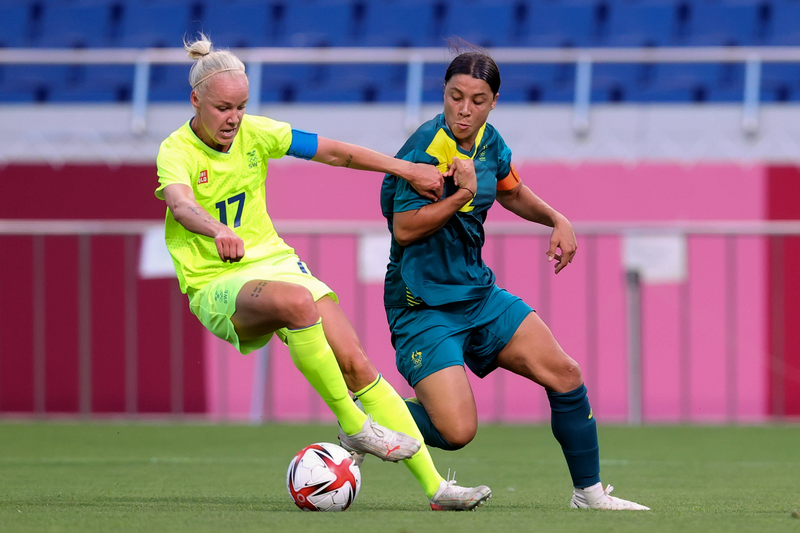Caroline Seger is captaining Sweden at her fourth Olympics
Swedes being tipped for gold after some hugely impressive showings
Seger speaks about embracing that status and why these Games feel different
In a colossal career spanning 12 major tournaments and a European record 219 international appearances, Caroline Seger has seen and done almost everything. These Olympics, though, are reminding her of the almost.
Conspicuous by its absence, she says, is the one thing she craves most. “A gold medal,” Seger told FIFA.com. “It’s the one ingredient missing for me in what has been a very long and happy career.”
Having captained Sweden to yet another accomplished victory on Friday, Seger is now just two games from realising that lifetime’s ambition. But before she discovers whether this Olympic road will be paved with gold, the route itself is already yielding other novel and gratifying experiences.
The increasingly widespread ordination of Sweden as title favourites is one. And while other players might choose to downplay or dismiss that status, protecting themselves against the prospect of being seen to underperform, Seger embraces the rising expectations.
“I don’t have a problem with it,” she said of being declared favourites. “It is the first time I can ever remember hearing it in all my years with the team; normally we’re always the underdogs. And it tells me that we must be doing something pretty good at this tournament.
“It shows too that opinions of this team are changing, and I’m proud to be a part of that. It’s cool to be in front seat for a change.”

No-one can accuse the Swedes of not earning that spot.
Their status as the only team with an unblemished record, and the only side in the last four to negotiate their quarter-final in 90 minutes, would be impressive enough in any context. But a look at the teams they’ve beaten - a list that includes the hosts and two fellow semi-finalists, the world champions included - shows just why Seger & Co are being viewed as the team to beat.
Sweden are also finding goals remarkably easy to come by against such high-calibre opposition, with their Tokyo 2020 tally of 12 already having tripled the entire haul from the team’s silver-winning campaign at Rio 2016.
“This Olympics does feel different, and the style of play is the main thing,” said Seger, a veteran of four Games – starting at Beijing 2008. “In Rio, for example, we really defended our way through that whole tournament to get to the final.
“This journey - playing so well and so positively against the US and Australia, scoring lots of goals, and going through with a game to spare - has felt completely different. We deserve to be where we are and we’re definitely a better team than we were in 2016.”
Better, and more flexible too. That was demonstrated in their quarter-final against Japan, when the swashbuckling style that stunned the Americans was replaced, at least for a time, by a more traditional, sturdy Swedish set-up.
“I think it’s a big strength that we can switch between the two styles when we need to,” Seger said. “We’re more attacking now, we want to control games more, but we knew against Japan that we were playing a team that’s outstanding in possession. They really are incredible team.
“But if you go back down the years and the tournaments, Sweden has always been successful in our organisation and the way we defend. It’s something we still feel very comfortable doing when the situation arises. You need to have both sides of the game to be successful, and no-one in our team wants to add new elements and lose the old ones.”
Defence and attack will, Seger knows, need to be functioning flawlessly when Sweden take on Australia in Monday’s semi-final. After all, the 4-2 scoreline in the sides’ group-stage meeting belied an evenly matched encounter that ebbed and flowed before finally ending in the Europeans’ favour.
And in Tony Gustavsson, a fellow Swede under whom Seger worked and reached a UEFA Women’s Champions League final at Tyreso, the Matildas may have something of a secret weapon.

“Tony’s a really smart and very tactical coach, and he also knows our players very well, so that’s definitely a bit of an advantage for them to have him,” Seger acknowledged. “When he took over there, I think he looked to change the team a lot in a very short space of time. That doesn’t always bring results immediately. But you can see them growing as a team, and growing into this tournament too.
“They’ll pose a totally different challenge to Japan, with a lot more counter-attacks. They obviously have a very big threat in Sam Kerr, who’s an excellent player, but I’ve been impressed with their midfield too – [Emily] van Egmond especially.”
On the subject of masterful midfielders, and while too modest to say so, Seger herself seems to be playing as well as ever. And for all the thrills that accompanied her first Olympic experience back in 2008, and reaching the final in Rio, these fourth Games are setting a new standard.
“The big difference is the feeling I have knowing this is my last Olympics,” said the 36-year-old, who has not ruled out playing on to the 2023 FIFA Women’s World Cup. “Every time I go on the field, I’m soaking it in as it might be my last Olympic match. And I’m enjoying it more because of that.”
Whatever happens now, Seger can be guaranteed that her Olympic story won’t end against Australia. But a happy ending is at stake, and it will be determined by whether Monday’s semi-final leaves her battling for bronze - or still going for gold.
